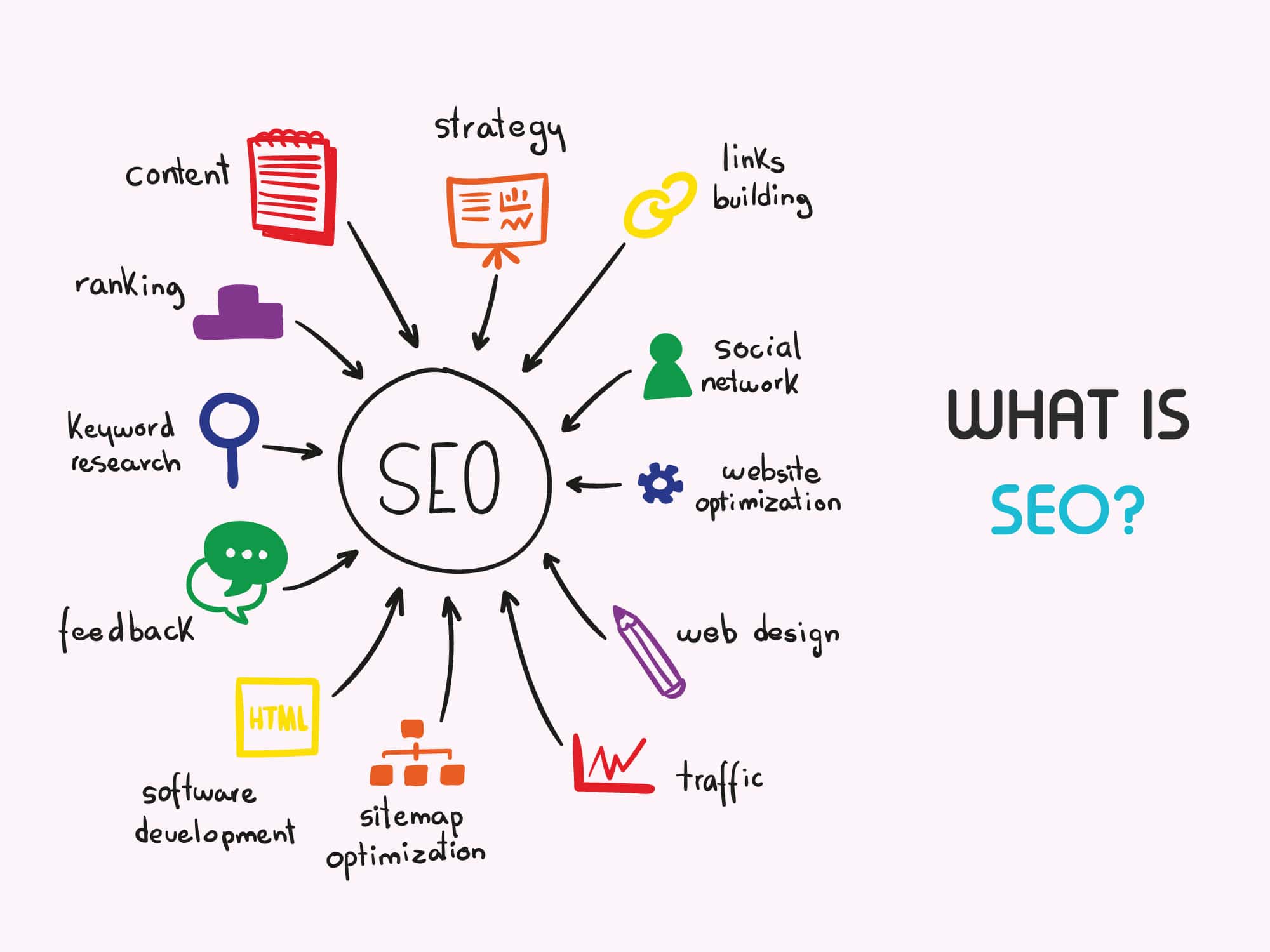A person who optimizes websites for better search engine results is an SEO professional (or “SEO specialist”).
Due to its emphasis on and comprehension of user intent, organic search is the core of digital marketing, making an SEO specialist a crucial member of the marketing team. Achieving a top rank may significantly influence your company’s development and income when you consider that sites that can claim the top five spots on the SERPs receive an estimated 68% of hits.
Most individuals don’t learn SEO through a conventional 4-year college degree because the industry of SEO is so young. Numerous people find becoming an SEO expert intimidating, but there are many straightforward SEO ideas to get you started.
Search engine optimization, also known as SEO, enhances a company’s searchability to drive unpaid, natural traffic to its website. When users search for specific keywords, SEO makes websites more visible on search engine result pages (SERPs). It aids in attracting target audiences’ attention to the brand, goods, or services.
A website optimized for search engines (SEO) is one that the search engines recognize as having the most relevant and accurate information or material to a search query and the searcher’s purpose.
What does an SEO professional (or specialist) do?
Businesses of all sizes—even 74% of small-to-midsized companies—want a good SEO practitioner to take them there because 95% of all search traffic originates from the first page. This is feasible thanks to an SEO expert. To raise a website’s ranks, they develop tactics that align with the most recent updates to search engine algorithms.
An SEO specialist also emphasizes a good user experience, and recent Google updates favor material that meets user needs. Using the appropriate keywords that not only put the brand in front of the target audience but also are consistent with user search intent is what SEO specialists do; in other words, they don’t pack keywords into their content.
-
Learn the basics of SEO
Its ranking may materially impact a company’s performance. Thus, it should be no surprise that knowledge of search marketing is one of the most in-demand abilities, whether it’s a full-time profession or simply a small part of a job in marketing or promotions.
A recent survey discovered a 43% rise in job postings for SEO positions year over year.
Due to the ever-increasing complexity of search engine optimization and its critical role in generating traffic, SEO specialists are quickly becoming an essential part of every marketing team. Even non-specialist team members, from interns to CEOs, should be knowledgeable about SEO.
In other words, it’s always a good idea to learn more about how search engines operate and to sharpen your SEO techniques.
As a small but representative example, the emergence of voice search has profoundly impacted how people search on Google’s platform. How results are presented can significantly impact SEO; for example, the sudden popularity of rich snippets and knowledge boxes is already altering the game for SEO specialists. Given that Google has already acknowledged that more than half of all searches are now made on mobile devices, most professionals are also preparing for a more significant move to mobile.
SEO specialists must be knowledgeable in a structured setting promoting comprehensive, effective, and current learning. With an instructor’s guidance, you can be sure that the time you spend studying is concentrated on what matters most and that you’ll get feedback to keep your progress on track.
-
Learn About Important SEO Tools
There is much more to SEO (and the associated discipline of SEM, search engine marketing) than just keywords. It takes a multilayered strategy, a lot of labor, and a lot of planning to properly generate and optimize content across all platforms, including various search engines, search techniques, display kinds, and social media platforms.
Fortunately, there are tools to assist you in creating, formatting, and posting your material and monitoring what is effective and requires improvement. Additionally, there are tools to aid in automating many of the most time-consuming chores for an SEO professional, increasing your productivity and ensuring that you can concentrate on producing excellent content.
Some of these tools are the platforms, such as social media channels where you’ll be putting your organic content, or SEM tools like Google Ads or Microsoft Advertising. Other closely linked analytic tools, like Google Analytics or Google Trends, are used with these systems.
As soon as you have a firm understanding of the search landscape, you’re prepared to advance to higher-order digital tools like Ahrefs, which is made to assist you in conducting research on SEO keywords and identifying the best search terms for your content, whether you’re writing a blog for your audience or adding enhanced descriptions to your product listings.
There are tools for practically every SEO management task:
To review your audience targeting, use Moz
Cyfe can combine the analytics from all of your social media outlets
SpyFu to track changes in the traffic of your rivals
Use Google Page Speed Insights to see how quickly your pages load
-
Continue to Develop and Sharpen Your SEO Techniques
Your job as an SEO specialist is founded on using the appropriate digital tools. Once you’ve mastered their use, you’re prepared to advance to higher-order skills and best practices that will give you a competitive advantage. These include more advanced methods of content optimization as well as soft skills, like strategic thinking, which should underpin your entire SEO strategy.
Technical SEO, which involves modifying a website’s technical components to raise its search engine rating and exposure, is a smart tactic to use at this point. Indexing, rendering, and website architecture are technical SEO methods that aim to make a website quicker and simpler for web crawlers to locate and comprehend.
You’ll be honing crucial soft skills for SEO experts as you expand your toolkit, including communication and interpersonal skills, admin and organization skills, and analytical and strategic thinking. Working in SEO often entails collaboration with others on a team and direct involvement with textual material. Knowing how to communicate effectively is not just a plus; it’s a requirement for the position because connecting with an audience is a big part of it.
Your good writing abilities will undoubtedly be put to use even if you’re not the one creating the material for the website; instead, you’ll probably be editing someone else’s work to improve the use of certain keywords, in addition to composing headlines, abstracts, snippets, and captions.
But ultimately, SEO is all about strategy. Content optimization is a combination of art and science, and you must be able to analyze the data you have in front of you and comprehend what it means. Analytics tools may be used to do A/B tests and track the source of your visitors, but there needs to be a clear consensus on how to use the results.
-
Create a project portfolio
As you develop your abilities, your projects might continue long after finishing the practice phase. These practice campaigns will serve as the foundation for your professional SEO portfolio, which is likely the most crucial component of your job hunt, especially if you are not presently employed in SEO.
An SEO specialist should present their research, planning, analysis, and strategic thinking rather than showcasing a finished website to show that they clearly understand procedures and outcomes.
-
Perform SEO on your own website to demonstrate your abilities
To showcase your abilities, you have a neatly displayed portfolio of your work. Apply them to your website to demonstrate your expertise in SEO, demonstrate that you are putting your money where your mouth is, and draw in future employers.
For example, writing posts and articles for other websites can help you engage with your professional community, position yourself as a thought leader, and enhance your professional profile. It will also increase traffic to your website and aid in link-building activities, which affect its ranking.
You may network with people in your field of work while simultaneously honing your abilities through SEO conferences, workshops, virtual summits, and tools like Search Engine Journal.
-
Create a portfolio for SEO
Putting such a portfolio is made more difficult for an SEO specialist because their job outcomes need to be more well-represented by the type of information the consumer sees. You must display your procedures and results to highlight your study, planning, analysis, and strategic thinking rather than just showing the final product.
Start by emphasizing your training and experience in digital marketing by explaining to the reader how you did it, possibly by concentrating on a particular project. Describe the SEO classes you took, the methods and strategies you employed, the insights you acquired, etc.
Your portfolio may convey a tale that starts with your goals, obstacles you encountered, and solutions you came up with.
The best recommendation you can get is from statistics, so try to find concrete indicators of the success of your SEO campaigns, such as highly ranked blog posts or web pages, an increase in total pageviews or new visitors, a wider audience in the mobile market, a rise in your page rankings, or even a quantifiable reduction in your page load times.
You’ll need to use numbers for these, and while more is usually better, be careful to display them in a way that has an effect without being overwhelming.
-
Continue to increase your SEO expertise
The Internet never sleeps; therefore, to remain competitive as an SEO expert throughout your career, you’ll need to improve your abilities continuously (and demonstrate to potential employers that you are doing so).
This implies that your portfolio and resume are never finished.
These data not only highlight the significance of SEO but also provide crucial information on how optimizing mobile or voice searches may increase your website’s traffic.
Because of this, SEO tactics that were effective a few years ago may already be completely obsolete. To keep current in a constantly growing sector, it is essential to update your understanding of SEO frequently.
FAQ:
Does SEO have a future?
Yes, SEO is booming, and there is still a high demand for SEO specialists and digital marketers. In 2019, there were more than 47,000 job opportunities on LinkedIn that contained the phrase “SEO,” and considering that 2020 will see an increase in digitalization, these numbers are expected to rise.
What Does an SEO Specialist Get Paid?
According to the employment website Indeed, an SEO Specialist makes an average pay of $52,590. For the more experienced SEO Manager, this amount increases to an average of $87,267 per year.
How Can I Launch My SEO Career?
The hard part of being an SEO expert is learning the necessary abilities, but even if you do, finding companies and landing a job remains.
- It pays to get your CV properly since, in most situations, it will be a prospective employer’s initial point of contact with you. Here, simplicity is preferable.
- Where applicable, use bullet points.
- The focus should be on your experience, training, and talents in SEO, with concrete data supporting your successes (bearing in mind that your portfolio is the place to dive into details).
- Technical SEO skills (including proficiency with the software, platforms, and digital tools of SEO), transferrable SEO skills (such as sales, marketing, or communications abilities), and adaptive SEO skills are the three main categories that SEO talents traditionally come under (like strategy, teamwork, and organization).
- Your understanding of technical SEO best practices and approaches should be the first thing the reader notices when they look at your CV. Thus that first category should be given prime billing on your resume.
- Then they can be included at the bottom of the page or incorporated throughout as transferable and adaptable abilities.

